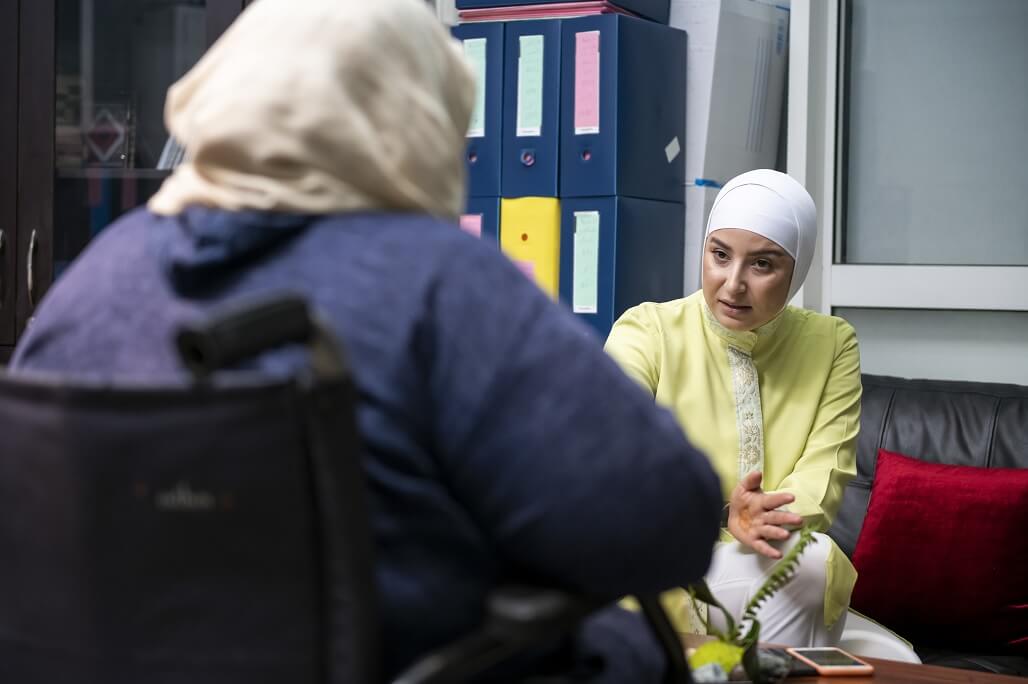In the words of Fadoua el Filali: “We are here to serve her and to fulfil her rights”
Date:
Fadoua el Filali is Head of the Cell for Women Victims of Violence at the First Instance Court, Salé. She has been assisting women survivors of violence to access justice and other essential services for many years. Recently, she has worked to find new ways to reach and help women during the COVID-19 pandemic.

“It is a battle. To win this battle, we must use all the available resources and work with everyone - police, health providers, the National Mutual Aid, local authorities and civil society organizations. We must constantly coordinate to ensure the safety of women. We must communicate, share experiences and keep improving our response services. We cannot overcome this battle alone.
Sometimes, it is beneficial to share common stories, feelings and talk about cases with others. Training and workshops equip us with tools, techniques and skills to better respond to survivors of violence. But importantly, these opportunities also allow us to meet our peers to share experiences, knowledge and learn from each other. It helps us to build the strongest judicial file possible and discuss potential resources available to us.
We are most afraid of the repetitive cycle of violence; seeing the same woman walk through our door again and again. The consequences I see in women survivors is enormous and deep-rooted. To break the cycle of violence, we must give survivors all the essential services they need to recover. We must help empower them economically and ensure the perpetrator is punished and provided with psychological treatment. That is the only way to end the cycle.
The COVID-19 pandemic allowed us to assess what we do and what we can do better. It also allowed the Office of the Public Prosecutor to find innovative ways to ensure all women and girls experiencing violence have access to judicial services. We published the contacts of the courts and cells for women victims of violence online, and we set up a helpline and WhatsApp number that are accessible at all hours. We also created online platforms for women to file complaints so we can provide timely and effective intervention.
During the lockdown, the phone did not stop ringing, and we received many cases via electronic platforms. Thanks to the coordination with various institutions and civil society organizations, we have provided support to more than 60 women in accessing shelters since the national lockdown began in March 2020.
What makes me happy is when the survivor reassures me that she is safe and has received the care she came for; the care she is entitled to. It makes me happier when I see women survivors protected judicially and becoming economically independent. We are here to serve her and to fulfil her rights. We have been entrusted with a responsibility to ensure that women survivors of violence receive quality support. We want to stop the violence.”
UN Women Morocco, with the support of the Government of Canada, supports the justice, police, and social services sectors to improve the quality, availability, and accessibility of essential services for women and girls who are survivors of violence according to international norms and standards.
UN Women, together with UNFPA, UNDP, UNODC and WHO, developed a Regional Flagship Programme to address Violence Against Women and Girls in the Arab States to bridge research with policy recommendations, provide guidance to adapt international standards in service provision to the region, and strengthen interagency understanding and collaboration in areas such as prevention. A key part of the programme includes the recent launch of the Handbook on Gender-Responsive Police Services for Women and Girls Subject to Violence. The handbook is being rolled out by UN Women with police middle managers across the region and gives practical, in-depth guidance on how to respond during crises like the COVID-19 pandemic; prevent violence against women and girls in conflict settings; and tackle online violence.